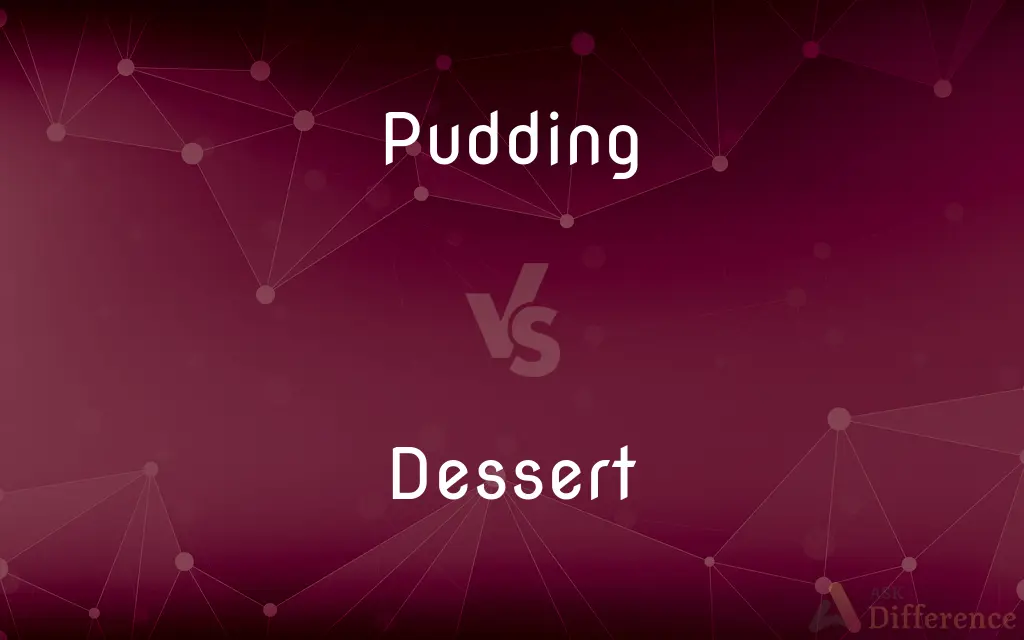Pudding vs. Dessert — What's the Difference?
By Tayyaba Rehman — Updated on September 22, 2023
Pudding is a specific creamy or custardy dish. Dessert is a general term for sweet courses or treats post meal. While all puddings are desserts, not all desserts are puddings.

Difference Between Pudding and Dessert
Table of Contents
ADVERTISEMENT
Key Differences
Pudding and dessert, while often used interchangeably in casual conversations, have distinct meanings. Pudding is a type of food that can vary in consistency but is often creamy or custardy. In the US, for example, pudding typically refers to a milk-based custard dish that is sweetened and thickened, frequently enjoyed as a treat or a sweet dish.
Dessert, on the other hand, is a broader term that encompasses a wide variety of sweet courses or treats consumed after a meal. This can include cakes, pies, ice creams, cookies, and yes, even puddings. When one talks about dessert, it is a reference to any sweet dish that concludes a meal, irrespective of its composition or origin.
Another point of distinction is the cultural variations associated with pudding. In the UK, 'pudding' can refer to what Americans might call a dessert in general, but it can also mean specific dishes, both sweet and savory, such as Yorkshire pudding or black pudding. Thus, the definition of pudding can shift depending on the geographical context.
In contrast, the term 'dessert' remains relatively consistent across cultures, generally pointing towards a sweet treat or course following the main meal. So, while a pudding is always a dessert, the universe of desserts extends far beyond just puddings.
Comparison Chart
Definition
A specific dish, often creamy or custardy.
Broad term for sweet courses/treats after a meal.
ADVERTISEMENT
Scope
Narrower term referring to a particular dish.
Wider term, including various sweet foods.
Cultural Variation
Meaning can vary by region (e.g., US vs. UK).
Generally consistent across cultures.
Type
Can be sweet or savory in certain cultures.
Predominantly sweet.
Examples
Chocolate pudding, rice pudding.
Cakes, pies, ice creams, cookies, puddings.
Compare with Definitions
Pudding
A specific dessert dish, particularly in the US.
Vanilla pudding is her favorite treat.
Dessert
A category of foods including cakes, pastries, ice creams.
The dessert menu had a wide variety of options.
Pudding
A creamy, sweet custard-like dish.
She made a delicious chocolate pudding for dessert.
Dessert
A sweet course eaten at the end of a meal.
For dessert, we're having apple pie.
Pudding
A dense, soft dessert, often with ingredients like rice or bread.
Bread pudding with a caramel sauce is delightful.
Dessert
Any sweet dish, typically served post main course.
She always has room for dessert.
Pudding
Pudding is a type of food that can be either a dessert or a savory (salty or spicy) dish that is part of the main meal.In the United States and Canada, pudding characteristically denotes a sweet, milk-based dessert similar in consistency to egg-based custards, instant custards or a mousse, often commercially set using cornstarch, gelatin or similar collagen agent such as Jell-O. The modern American usage to denote a specific kind of dessert has evolved over time from the originally almost exclusive use of the term to describe savory dishes, specifically those created using a process similar to that used for sausages, in which meat and other ingredients in mostly liquid form are encased and then steamed or boiled to set the contents. Black (blood) pudding and haggis survive from this tradition.In the United Kingdom and some of the Commonwealth countries, the word pudding is still used to describe both sweet and savory dishes.
Dessert
Sweet treat consumed to satisfy a sugar craving.
He grabbed a quick dessert from the bakery.
Pudding
A sweet, soft dessert, often with a base of milk or cream thickened by flour, cornstarch, or a cereal product, that has been boiled, steamed, or baked
Chocolate pudding.
Rice pudding.
Dessert
Concluding course, often contrasting the savory dishes before it.
The meal was great, especially the dessert.
Pudding
An edible mixture with a soft, puddinglike consistency
Corn pudding.
Dessert
Dessert () is a course that concludes a meal. The course consists of sweet foods, such as confections, and possibly a beverage such as dessert wine and liqueur.
Pudding
A sweet dish eaten at the end of a meal; dessert.
Dessert
A usually sweet course or dish, as of fruit, ice cream, or pastry, served at the end of a meal.
Pudding
A sausagelike preparation made with minced meat or various other ingredients stuffed into a bag or skin and boiled.
Dessert
Chiefly British Fresh fruit, nuts, or sweetmeats served after the sweet course of a dinner.
Pudding
Any of various dishes, sweet or savoury, prepared by boiling or steaming, or from batter.
Dessert
The last course of a meal, consisting of fruit, sweet confections etc.
I ordered hummus for a starter, a steak as the main course, and chocolate cake for dessert.
Can I see the dessert menu, please?
Pudding
A type of cake or dessert cooked usually by boiling or steaming.
Dessert
A sweet dish or confection served as the last course of a meal.
Trifle is a favourite dessert of the English, but rivalled by pavlova in Australia and New Zealand.
Pudding
A type of dessert that has a texture similar to custard or mousse but using some kind of starch as the thickening agent.
Dessert
A service of pastry, fruits, or sweetmeats, at the close of a feast or entertainment; pastry, fruits, etc., forming the last course at dinner.
"An 't please your honor," quoth the peasant,"This same dessert is not so pleasant."
Pudding
Dessert; the dessert course of a meal.
We have apple pie for pudding today.
Dessert
A dish served as the last course of a meal
Pudding
(originally) A sausage made primarily from blood.
Pudding
(slang) An overweight person.
Pudding
(slang) Entrails.
Pudding
(obsolete) Any food or victuals.
Pudding
A piece of good fortune.
Pudding
A species of food of a soft or moderately hard consistence, variously made, but often a compound of flour or meal, with milk and eggs, etc.
And solid pudding against empty praise.
Pudding
Anything resembling, or of the softness and consistency of, pudding.
Pudding
An intestine; especially, an intestine stuffed with meat, etc.; a sausage.
Pudding
Any food or victuals.
Eat your pudding, slave, and hold your tongue.
Pudding
Same as Puddening.
Mars, that still protects the stout,In pudding time came to his aid.
Pudding
Any of various soft thick unsweetened baked dishes;
Corn pudding
Pudding
(British) the dessert course of a meal (`pud' is used informally)
Pudding
Any of various soft sweet desserts thickened usually with flour and baked or boiled or steamed
Pudding
A dish, either sweet or savory, boiled or steamed in a cloth or bag.
The Christmas pudding was a family tradition.
Pudding
General term for dessert in some UK contexts.
What's for pudding tonight?
Common Curiosities
Can desserts be savory?
Typically, desserts are sweet, but some cultures may have mildly sweet or neutral desserts.
What's the main ingredient in a typical American pudding?
American puddings are usually milk-based and thickened with agents like cornstarch.
Are ice creams and pies considered puddings?
No, they are types of desserts, but not puddings.
Are puddings always cold?
Not always. Some puddings, like bread pudding, can be served hot.
What's the difference between dessert and sweets?
"Dessert" refers to the course, while "sweets" can refer to candies or sweet dishes in general.
Is every pudding considered a dessert?
While most puddings are desserts, some savory puddings, like Yorkshire pudding, aren't.
Are fruits considered desserts?
Fruits can be served as desserts, especially if presented in a sweet dish form.
Can puddings contain meat?
In some cultures, yes. For example, black pudding contains blood and fillers.
Can a dessert be a main course?
While uncommon, some might eat sweet dishes as mains, but traditionally, desserts conclude meals.
Is 'dessert' a term used universally?
While the concept exists everywhere, the term 'dessert' might differ across languages and cultures.
Why is the UK usage of pudding different from the US?
Linguistic evolution and cultural differences have led to varied usage.
Which is healthier: pudding or dessert?
It varies by recipe. Both can be made healthier or indulgent based on ingredients.
Is cheesecake a pudding?
No, cheesecake is a type of dessert, but not categorized as a pudding.
Can a pudding be baked?
Yes, certain puddings, like bread pudding, are baked.
Is chocolate mousse a pudding?
While similar in texture, mousse and pudding differ in preparation and ingredients.
Share Your Discovery

Previous Comparison
Comedy vs. Melodrama
Next Comparison
Editorial vs. ArticleAuthor Spotlight
Written by
Tayyaba RehmanTayyaba Rehman is a distinguished writer, currently serving as a primary contributor to askdifference.com. As a researcher in semantics and etymology, Tayyaba's passion for the complexity of languages and their distinctions has found a perfect home on the platform. Tayyaba delves into the intricacies of language, distinguishing between commonly confused words and phrases, thereby providing clarity for readers worldwide.















































